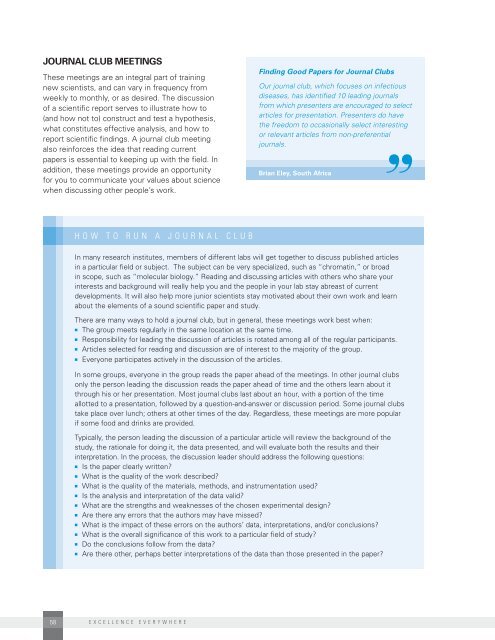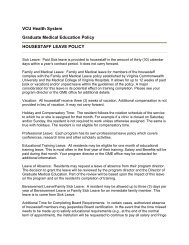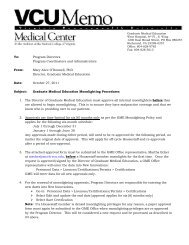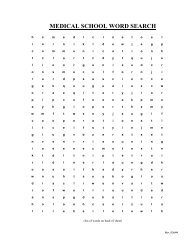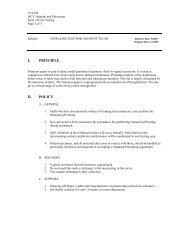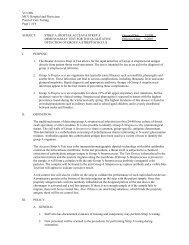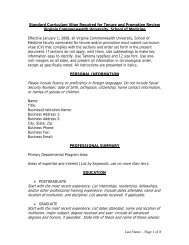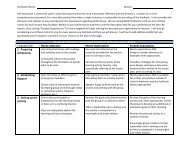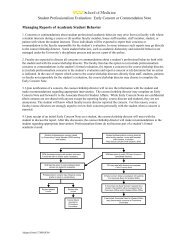Journal club meetingsThese meetings are an integral part <strong>of</strong> trainingnew scientists, and can vary in frequency fromweekly to monthly, or as desired. The discussion<strong>of</strong> a scientific report serves to illustrate how to(and how not to) construct and test a hypothesis,what constitutes effective analysis, and how toreport scientific findings. A journal club meetingalso reinforces the idea that reading currentpapers is essential to keeping up with the field. Inaddition, these meetings provide an opportunityfor you to communicate your values about sciencewhen discussing other people’s work.Finding Good Papers for Journal ClubsOur journal club, which focuses on infectiousdiseases, has identified 10 leading journalsfrom which presenters are encouraged to selectarticles for presentation. Presenters do havethe freedom to occasionally select interestingor relevant articles from non-preferentialjournals.”Brian Eley, South AfricaHow to run a Journal CLubIn many research institutes, members <strong>of</strong> different labs will get together to discuss published articlesin a particular field or subject. The subject can be very specialized, such as “chromatin,” or broadin scope, such as “molecular biology.” Reading and discussing articles with others who share yourinterests and background will really help you and the people in your lab stay abreast <strong>of</strong> currentdevelopments. It will also help more junior scientists stay motivated about their own work and learnabout the elements <strong>of</strong> a sound scientific paper and study.There are many ways to hold a journal club, but in general, these meetings work best when:n The group meets regularly in the same location at the same time.n Responsibility for leading the discussion <strong>of</strong> articles is rotated among all <strong>of</strong> the regular participants.n Articles selected for reading and discussion are <strong>of</strong> interest to the majority <strong>of</strong> the group.n Everyone participates actively in the discussion <strong>of</strong> the articles.In some groups, everyone in the group reads the paper ahead <strong>of</strong> the meetings. In other journal clubsonly the person leading the discussion reads the paper ahead <strong>of</strong> time and the others learn about itthrough his or her presentation. Most journal clubs last about an hour, with a portion <strong>of</strong> the timeallotted to a presentation, followed by a question-and-answer or discussion period. Some journal clubstake place over lunch; others at other times <strong>of</strong> the day. Regardless, these meetings are more popularif some food and drinks are provided.Typically, the person leading the discussion <strong>of</strong> a particular article will review the background <strong>of</strong> thestudy, the rationale for doing it, the data presented, and will evaluate both the results and theirinterpretation. In the process, the discussion leader should address the following questions:n Is the paper clearly written?n What is the quality <strong>of</strong> the work described?n What is the quality <strong>of</strong> the materials, methods, and instrumentation used?n Is the analysis and interpretation <strong>of</strong> the data valid?n What are the strengths and weaknesses <strong>of</strong> the chosen experimental design?n Are there any errors that the authors may have missed?n What is the impact <strong>of</strong> these errors on the authors’ data, interpretations, and/or conclusions?n What is the overall significance <strong>of</strong> this work to a particular field <strong>of</strong> study?n Do the conclusions follow from the data?n Are there other, perhaps better interpretations <strong>of</strong> the data than those presented in the paper?58 excellence everywhere
Finding Good Papers for Journal Clubsn Search on Medline for your field/subject<strong>of</strong> interest.n Look through relevant journals that theresearch institute/university departmentsubscribes to.n Look at papers that your collaboratorshave published.n Discuss papers <strong>of</strong> interest that have justbeen presented at a recent conference,especially if full papers are available.”Susan Mutambu, ZimbabweInformal group activitiesOrganizing social occasions to celebrate a majoraccomplishment—publication <strong>of</strong> a paper, a teammember getting a new job, the group getting anew grant, and so on—is important for promotingyour shared vision <strong>of</strong> the lab and building morale.In some groups, a souvenir like a copy <strong>of</strong> thenewly successful grant or celebratory champagnebottle signed by the whole team, a group photo,or some other lasting sign <strong>of</strong> the day is kept andproudly displayed for continued inspiration. Also,most heads <strong>of</strong> laboratories agree that it is importantthat lab members occasionally socialize in arelaxed, non-work environment. Such get-togetherscan help promote a team feeling and enhancecommunication among lab members. As you areestablishing your lab, you might have to arrangethese outings. After a while, they will occur morespontaneously. Do not feel that you always haveto participate, and do not feel <strong>of</strong>fended if you arenot invited to all after-hours occasions, especiallyif your role in your organization puts you at a muchhigher level <strong>of</strong> seniority and responsibility thanthose on your team.Giving and Receiving FeedbackGiving and receiving feedback is a critical leadershipskill. Receiving feedback from individuals inyour lab will help you improve as a leader, and willhelp you steer people toward your vision. In turn,giving them feedback will help them develop asscientists and will ensure that your expectationsare met. Even if you have a very formal mannerwith your lab, feedback should be given informallyon a daily basis, as well as during formal meetings.You do not have to be everyone’s friend in the labto do this—providing small comments will do.Remember that although one <strong>of</strong>ten notices criticismand correction more, positive feedback, forexample “Thanks for making sure this got doneon time,” or “Keep trying, this is a tough technicalproblem that we need to get through, and you areusing a good, systematic approach to do that,” isalso important.When you give feedback to people in the lab, try to:n Time it well. Feedback delivered during stressfultimes (e.g., when a grant deadline is looming) israrely helpful, especially when either party isangry or elated, or when someone walked into adiscussion not expecting to hear critique, good orbad, about the work.guidelines for effective meetingsn Solicit agenda items and distribute an agenda before the meeting.n Have clear assigned roles for the meeting—that is, who will speak, who will take notes, who willlead the discussion.n For each action item on the agenda, go over discussion points, make a decision, and determinepost-meeting actions.n Discuss what should be on the next meeting’s agenda.n Follow up the meeting with a meeting summary and a to-do-by-what-date list.managing your many roles59
- Page 3 and 4:
A R e s o u r c e f o r S c i e n t
- Page 5 and 6:
Table of ContentsVII119PrefaceChapt
- Page 7:
135 Chapter 10E x p a n d i n g Y o
- Page 15 and 16:
Q u e s t i o nq&aWhat Is a “Tenu
- Page 17: preparing for immediate submission,
- Page 22 and 23: Practicing the Talkn Practice your
- Page 24 and 25: your one-on-one interviews you have
- Page 26 and 27: If talking directly about money is
- Page 28 and 29: When the institution responds and y
- Page 30 and 31: equipment and supplies. Maintenance
- Page 32 and 33: Q u e s t i o nq&aIs your instituti
- Page 34 and 35: Working With Human SubjectsWhether
- Page 36 and 37: RESPONSIBILITIES BEYONDTHE LABORATO
- Page 38 and 39: UNDERSTANDING YOURINSTITUTION AND H
- Page 40: Criteria for PromotionStructure of
- Page 45 and 46: Q u e s t i o nWhat’s in a Name?q
- Page 47 and 48: Screening ApplicantsWhen you review
- Page 50 and 51: Interpersonal Skillsn How important
- Page 52 and 53: Multinational Organizations are hir
- Page 54 and 55: n If there is an office that handle
- Page 57 and 58: n Seek funding and publish papers (
- Page 59 and 60: In fact, even though you yourself h
- Page 61 and 62: n Craft a statement that you feel c
- Page 63 and 64: n When you delegate authority to so
- Page 65 and 66: n Use only pens, preferably with wa
- Page 67: Strategy sessionsShould you decide
- Page 71 and 72: If possible, invite people in your
- Page 73 and 74: Q u e s t i o nq&aHow do I avoid po
- Page 75 and 76: The International Committee of Medi
- Page 77 and 78: Managing Conflictin the LabConflict
- Page 79 and 80: steps for dealing with conflictWhen
- Page 81 and 82: chapter 5managing your time“ Succ
- Page 83 and 84: Check your work: the 90-year though
- Page 85 and 86: n Make and keep appointments with y
- Page 87 and 88: n Help them seek advice without tak
- Page 89 and 90: FAMILY MATTERSMany scientists face
- Page 91 and 92: chapter 6project management“ We m
- Page 93 and 94: My project is to get a grant funded
- Page 95: ObjectivesObjectives are the end re
- Page 98 and 99: The key events schedule and the act
- Page 100 and 101: Microsoft Project, a program that s
- Page 102 and 103: Martin, Vivien. Managing Projects i
- Page 104 and 105: appendix II: Example of a Work Brea
- Page 106 and 107: appendix iv: Example of a Gantt Cha
- Page 108 and 109: e h i n d c l o s e d d o o r s :w
- Page 110 and 111: Who might be interested in supporti
- Page 112 and 113: Call your program officerProgram of
- Page 114 and 115: direct costs vs. indirect costsDire
- Page 116 and 117: RESOURCESAllen, Ernest M. “Why ar
- Page 118 and 119:
the next generation of students (th
- Page 120 and 121:
Seek Feedback through a Formal Peer
- Page 122 and 123:
Encouraging Student Questionsn Do n
- Page 124 and 125:
Here are some ways you can help the
- Page 126 and 127:
n Are there curriculum changes unde
- Page 128 and 129:
a relaxed format for talking about
- Page 130 and 131:
spend in preparing an effective cou
- Page 132 and 133:
The Publishing ProcessTypes of Jour
- Page 134 and 135:
A word about impact factorsThe impa
- Page 136 and 137:
C r e a t i n g a n i n t e g r a t
- Page 138 and 139:
may need to take the first author p
- Page 140 and 141:
submitting image filesToday, most i
- Page 142 and 143:
Submitting your Paper to Another Jo
- Page 144 and 145:
RESOURCESDavis, Martha. Scientific
- Page 146 and 147:
increase your impact as a scientist
- Page 148 and 149:
Q u e s t i o nq&aHow do I communic
- Page 150 and 151:
n Offer criticism and correction in
- Page 152 and 153:
It is important to discuss career g
- Page 154 and 155:
When Mentoring,Advisory, or Supervi
- Page 156 and 157:
For researchers in developing count
- Page 158 and 159:
n Is travel safe and convenient, or
- Page 160 and 161:
n The expected contribution of each
- Page 162 and 163:
Meetings. Set up systems to ensure
- Page 164 and 165:
SPECIAL CHALLENGESFOR THE BEGINNING
- Page 166 and 167:
e an important connection to future
- Page 168 and 169:
The invention of a new method or pr
- Page 170 and 171:
licensee, who can charge others for
- Page 172 and 173:
Most profound for developing countr
- Page 174 and 175:
Finally, the patents have been chal
- Page 176 and 177:
And, India benefited as a supplier
- Page 178 and 179:
paperwork involved in purchasing1.
- Page 180 and 181:
labeling mattersA case in point: In
- Page 182 and 183:
equipment, freeze-drying equipment,
- Page 184 and 185:
Responsibilityfor materialsIf an or
- Page 186 and 187:
Recent Improvementsin Materials Tra
- Page 188 and 189:
“Knowledge is power.” —Sir Fr
- Page 190 and 191:
MOUMemorandum of UnderstandingRFPRe
- Page 192 and 193:
notes continued182 excellence every
- Page 194:
notes continued184 excellence every


